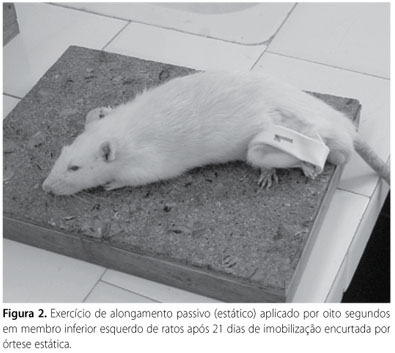BACKGROUND: Passive or static stretching (ALMP) is often used in rehabilitation programs and in sports; however, the morphological changes occurred are not very clear, especially after prolonged immobilization. AIMS:This study aimed to examine the muscle morphological and functional changes produced in response to three weeks of ALMP in an animal model of prolonged immobilization of hind limb (HL) in the short range. METHODS: For this purpose, 32 rats (Wistar) were used and divided in 4 groups (n = 8 each): A- control group (CONT), B - immobilized group for 21 days (IMMOB), C - remobilized group for 21 days (FREE), D - elongated group for 21 days (ELONG). The variables evaluated were body weight and muscle mass, muscle and bone length, number of myofibrils and quantity of collagen, determined by histomorphometry muscle by color contrast. The morphological variations between all the experimental groups were compared. RESULTS: The IMMOB of the femoral biceps in shortened position produced important muscular atrophy with compensatory hyperplasia, and increase (p <0.05) in collagen deposition in the perimysium and intramuscular of rats. The free remobilization and the passive stretching reduced significantly (p <0.05) these morphological changes observed in group IMMOB. CONCLUSIONS: Based on these results, it was concluded that both passive stretch and free remobilization promote restoration of the morphological changes induced by prolonged immobilization in the left femoral biceps of rats; however only passive stretching was able to reduce the correlation between collagen/muscle.
manual physiotherapy; passive stretching; prolong immobilization; muscle atrophy; histomorphometry





